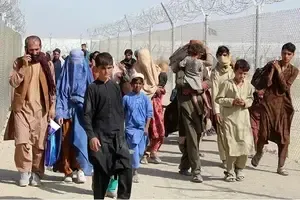Human Rights Organization Criticizes Pakistan for Forcibly Deporting Afghan Refugees

Synopsis
Key Takeaways
- Human Rights Watch demands an end to forced deportations.
- Afghan refugees face severe harassment in Pakistan.
- Many Afghans fear persecution upon return.
- Pakistani police have escalated abusive tactics against refugees.
- Over 800,000 Afghans were previously deported in a recent wave.
New York, March 19 (NationPress) The US-based advocacy organization Human Rights Watch (HRW) has called for an immediate halt to the forced deportation of Afghan refugees by Pakistan.
Pakistan has established a deadline of March 31 for the expulsion of all Afghan refugees. However, prior to this deadline, Pakistani authorities have been accused of escalating abusive measures and other forms of pressure on Afghan refugees to compel their return to Afghanistan.
Numerous reports indicate that Afghan refugees are enduring significant harassment and maltreatment in Pakistan. Afghan refugees, despite possessing valid legal documentation, report facing threats of illegal detention, deportation, and discrimination. They have urged various human rights organizations to advocate on their behalf.
The deportation poses grave dangers to refugees, exposing them to potential persecution and economic distress under the Taliban regime in Afghanistan.
"Pakistani officials must cease coercing Afghans to return and allow those at risk of expulsion the chance to seek protection," stated Elaine Pearson, Asia Director at Human Rights Watch.
According to the rights organization, Pakistani police have conducted raids on residences, physically assaulted individuals, and unlawfully detained people, seizing their refugee documentation, including residency permits. They have also solicited bribes to permit Afghans to remain in Pakistan.
The United Nations has noted that many Afghans returning to their homeland cite fears of detention by Pakistani authorities as their primary reason for leaving.
Masood Rahmati, an Afghan journalist, remarked that even those registered with the United Nations High Commissioner for Refugees (UNHCR) or possessing valid residency cards are not safe in Pakistan.
"We held PoR cards, yet the police destroyed our cards and expelled us to Afghanistan," recounted one Afghan refugee.
Sharing their traumatic experiences in Pakistan, Afghan refugees informed HRW that police raids occurred in their neighborhoods both day and night, leading to arbitrary detentions and extortion.
A 33-year-old Afghan woman residing in Islamabad recounted that raids in her locality commenced at 4 am, stating, "It felt as though they were hunting criminals. It’s a deeply distressing experience."
"They brought trucks and arrested individuals. If you refuse to open the door, they will enter through the windows. They show no regard for children or the elderly. I know of individuals with valid visas who had to pay between Rs 20,000 and 100,000 Pakistani rupees (approximately US$70 to $400) to avoid arrest," HRW quoted Zahra, an Afghan refugee who has lived in Pakistan since 2023.
A previous wave of deportations from September 2023 to January 2024 forced over 800,000 Afghans—many born in Pakistan or residing there for decades—back to Afghanistan. Since November 2024, Pakistani authorities have renewed their push to expel Afghans. Over 70% of those returning have been women and children, including secondary school-aged girls and women who will lose access to education.
Returning Afghan refugees generally abandon their properties and savings in Pakistan and often find limited livelihood opportunities or land in Afghanistan, according to HRW.
Last November, Pakistan's Interior Ministry declared that Afghans could not remain in Islamabad past December 31. By the end of December, police had apprehended over 800 Afghans in Islamabad. Since then, Pakistani authorities have reiterated calls for the expulsion of all Afghan refugees, as reported by the advocacy group.









